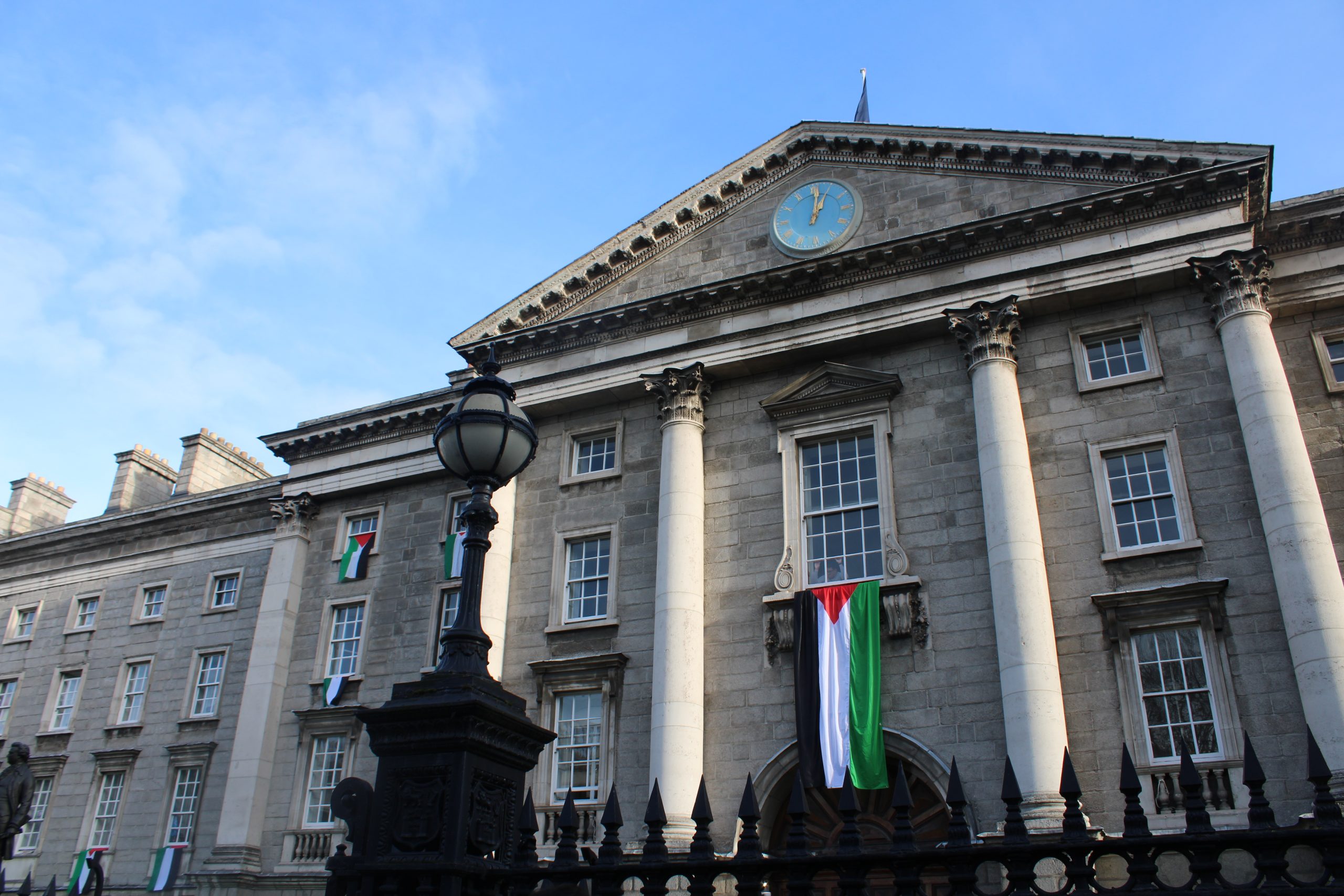Trinity Boycott, Divestment, and Sanction Implementation Group (Trinity BDS) have displayed Palestinian flags from the windows of College’s College Green facade to mark International Day of Solidarity with the Palestinian People.
According to a statement from the group, College refused a request to light up the front entrance with the Palestinian colours, which the group says “is cowardly from an academic institution that has a mission statement which includes ‘engaging with issues of global significance’”.
A spokesperson for College told Trinity News: “Clearly we could light up the college almost every day to celebrate or mark events of one kind or another. Many events are very important but endless displays would ultimately make the gesture meaningless.”
“To stop this from happening, the university has clear rules to govern when the front façade of College can be illuminated. Those rules focus on local and national events and do not allow for illumination to mark International Day of Solidarity with the Palestinian People.”
In March, College lit the entrance with the Ukrainian colours after the Russian invasion the previous month, which it “unequivocally condemned”.
The spokesperson for College said: “It is correct to say that the rules also do not encompass lighting the college to show solidarity with the people of Ukraine and I apologise to anyone who might have been offended by the fact that we did this.”
The statement from Trinity BDS added: “We believe our academic institution should take a principled stand against the egregious human rights abuses in Israel.”
Last week it was revealed that College has 13 ties to Israeli institutions, including the Weizmann Institute of Science, Tel Aviv University, and Technion – Israel Institute of Technology, which Trinity BDS says are complicit with the Israeli military and apartheid state.
The Trinity BDS statement continued: “We acknowledge that Trinity College Dublin recently restructured the investment portfolio of its two equity funds, and that College no longer holds investments in a number of weapons companies complicit in Israeli apartheid such as Lockheed Martin, Raytheon Technologies or BAE Systems. This was welcome news. However, anti-apartheid principles cannot be applied selectively.”
“International solidarity is crucial as Israel continues to expand its illegal settlements, seizing Palestinian peoples’ lands with violence,” the statement added. “As of 2022, the number of settlers living in occupied Palestine has grown to more than half a million.”
“Palestinian people cannot live in their own homeland. This is a human rights violation.”
The campaign group called on College to “cut all ties with the 13 organisations and enact a policy of BDS and non-cooperation with Israel College-wide”.
Chair of Trinity BDS Zaid Albarghouthi said: “On this day of significance to every global citizen we are making a statement about global institutions, holding great influence, choosing to address fundamental breaches of human rights selectively, depending on where their interests end.”
He continued: “As an institution, home to a student body, notable for its opposition to apartheid and occupation, Trinity College Dublin ought to reflect a proactive position as it did in similar issues of global significance.”
“We raise our flags to clearly state the fact that despite making progress on certain areas of policy, our institution must take a bolder stance.”
“College has been selective with the application of its values and has not been attentive to the underlying issue of a lack of transparency about its ties with Israel,” he added. “This is inadequate.”
“Our College is complicit in the apartheid regime as it has ties with 13 Israeli institutions, actively part of the regime or supporting its atrocities”, Albarghouthi concluded.
Addressing College’s “flag policy”, TCDSU President Gabi Fullam told Trinity News: “When we design systems of restriction, situations arise where they become blatantly nonsensical, and institutions then ask – who can we break them for?”
“The answer is usually clouded in bias and colourism. This is not to say that Trinity should not have lit up with Ukrainian colours at all. Instead, this evokes the same question when we can observe that Ukrainian refugees are entitled to ‘temporary protection’, which allows them to work, while most people living in direct provision now have no legal access to employment.”
Fullam continued: “We should ask: why are some refugees given better treatment than others? Why can’t every refugee be granted access to employment?”
“We do not criticise Ukrainian refugees for being given access to employment, nor do we call for it to be revoked – we ask for every refugee, conflict, and asylum seeker to be treated with equal worth. The same way we ask for each life to be given equal worth.”






